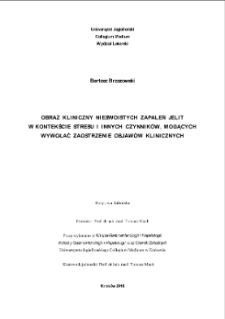Obiekt
Tytuł: The clinical manifestation of inflammatory bowel disease (IBD) in the context of stress and other factors that may cause exacerbation of clinical symptoms
Abstrakt:
INTRODUCTION: Inflammatory bowel disease (IBD) represents a group of chronic diseases of the GI tract, such as Crohn's disease (CD) and ulcerative colitis (UC). The diet, genetic predisposition, the immunological alterations, microbiota and stress were shown to contribute to the pathogenesis of IBD. OBJECTIVES: The aim of the study was to evaluate patients with CD and UC during exacerbation and remission phases and to investigate factors that may affect the clinical activity of the disease, with particular focus on stress. PATIENTS AND METHODS: In order to determine the mucosal expression and tissue concentration of TNF-α and IL-1β, patients underwent colonoscopy and the biopsy specimens were taken for 1) histological assessment of mucosal damage and 2) snap frozen in liquid nitrogen to examine the expression of IL-1β and TNF-α. For examination the effect of stress on the course of IBD patients were subjected to psychological tests.RESULTS: The statistical significance has been demonstrated when investigating the correlation between SSZ (Style focused on the task), SSE (Style focused on emotions) and serum CRP levels. Taking into consideration the correlation between the CISS score and the inflammatory parameters in the control group, the data were statistically significant (P <0.002. In addition, there was an increase in IL-1β and TNF-α mRNA gene expression in biopsies of bowe ; l mucosa in patients with IBD who had higher scores in the Stress Measurement Questionnaire.CONCLUSIONS: This study demonstrated that stress is an important pathogenic factor able to worsen the course of IBD as reflected by increased scores in variety of psychological questionnaires and the positive correlations with selected clinical markers of inflammation.
Miejsce wydania:
Stopień studiów:
Dyscyplina:
Instytucja nadająca tytuł:
Promotor:
Data wydania:
Identyfikator:
Sygnatura:
Język:
Prawa dostępu:
Kolekcje, do których przypisany jest obiekt:
Data ostatniej modyfikacji:
13 mar 2023
Data dodania obiektu:
6 maj 2019
Liczba wyświetleń treści obiektu:
16
Liczba wyświetleń treści obiektu w formacie PDF
1
Wszystkie dostępne wersje tego obiektu:
http://dl.cm-uj.krakow.pl:8080/publication/4275
Wyświetl opis w formacie RDF:
Wyświetl opis w formacie OAI-PMH:
| Nazwa wydania | Data |
|---|---|
| ZB-128621 | 13 mar 2023 |
Obiekty
Podobne
Brzozowski, Bartosz
Rozpondek, Piotr
Herman, Roma
Kaczmarczyk, Olga
Wasilewska, Agata
Cegielny, Tomasz
Wójcik, Dagmara
Świat, Agnieszka

